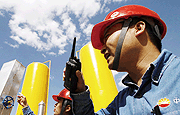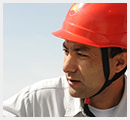 The petroleum & petrochemical industry is a high-risk industry, facing HSE challenges in every aspect of production and operation. Safety is one of the basic requirements to ensure the rapid development of our business and the health of our staff. We put safety at the top of our agenda and integrate it in our operations and the entire industry chain. We also launch the "Safety and Environmental Protection Year" campaign on a yearly basis, focusing on human-centered safety principles.
The petroleum & petrochemical industry is a high-risk industry, facing HSE challenges in every aspect of production and operation. Safety is one of the basic requirements to ensure the rapid development of our business and the health of our staff. We put safety at the top of our agenda and integrate it in our operations and the entire industry chain. We also launch the "Safety and Environmental Protection Year" campaign on a yearly basis, focusing on human-centered safety principles.
Based on the requirements specified in national laws and regulations, and according to our operational safety requirements, we have developed more than 10 management systems including Safety Prohibition, Management of Operational Safety Accidents and Management of Rewards for Reporting Risks. Five standards are issued including Grading Rules for Major Danger Sources. We have also strengthened supervision and management of safety and environmental protection performance at major fields and sectors, including well control, maintenance of oil refining units, pipeline engineering and offshore operations.
To emphasize safety management responsibility, we compile and implement a series of new regulations, including Management Procedures of Operational Safety and Environment Accountability,Risk Control Measures for Operational Safety, Guidance on HSE Responsibilities at CNPC Headquarters, and Implementation Rules for HSE Performance Reviews, etc. We also train and evaluate relevant management people and employees accordingly. To ensure operational compliance, we emphasize HSE accountability, enhance HSE inspection and acceptance management in construction projects, and take corrective measures for violations.
CNPC investigates potential risks to safety, and strengthens the control of risks at their source. Focusing on operational improvement, we establish a risk control mechanism, which is composed of risk classification, full responsibility coverage, and integrated solutions. We pay special attentions to the supervision of safety at key units and operations, such as marine operations. We strictly implement offshore petroleum operation licensing, license registration and job qualification certification systems, take effective safety measures to protect offshore operations from typhoons and storms, and make great efforts to remove major hidden risks such as sparks from flaring, and the accumulation of light crude components in cargo tanks. In addition, we allocate dedicated funds to identifying and correcting hidden safety risks related to pipelines intersecting with each other or subject to surface load, and facilities subject to corrosion and aging.
We upgrade the investigation and treatment of accidents without casualties to the highest-level, and establish effective channels for accident and incident reporting. Meanwhile, we review and address safety issues in relation to oil and gas pipelines. A pipeline safety supervision platform has been in place to enable the uploading and tracking of pipeline information, hazard data, corrective measures and follow-up actions.
Emergency ResponseCNPC pays particular attention to forecasting, early warning, and rapid response in our emergency response system, which is distinguished by a unified leadership, but with cross-functional responsibility and coordination. To improve our emergency response system, we revise the emergency response plan for pipeline operation and organize filing and on-site review of the emergency response plans of our affiliated companies.
To boast our capacity in handling various kinds of emergency response force supported by five bases specialized in firefighting, hazardous chemicals, long-distance oil/gas pipelines, and well control and offshore emergency rescue are better organized. CNPC well control emergency response center has been designated by the State Council as the Guanghan Base for oil/gas field rescue nationwide. To strengthen coordination and cooperation in oil spill response, we have established an integrated emergency response mechanism together with Sinopec and CNOOC for resource sharing and joint response in spill emergency and fire prevention, and the development and promotion of spill response technology. We also sign agreements with the maritime authorities of Hebei, Liaoning and Tianjin to implement an offshore emergency rescue coordination mechanism.
We make unremitting efforts to improve our emergency management system. In 2018, the version 2.0 of our emergency management system was launched, enabling the support system for the Company's emergency platform to leapfrog from the stage of platform building to the stage of deep integration and application, and further enhancing our comprehensive emergency response capabilities.
Hazardous Chemicals ManagementWe implement unified management over the production, operation, packaging, storage, transportation, use and disposal of hazardous chemicals.
In response to the explosion accident in Tianjin at the hazardous goods warehouse of Ruihai Logistics Company on August 12, 2015, we actively participated in the emergency rescue and cleanup of hazardous chemicals, and drew lessons from the accident. We conducted work safety inspection and targeted rectification of hazardous chemicals and inflammables and explosives, in order to timely rectify and screen out problems and hidden risks. We exercise full process management on hazardous chemicals covering production, storage and transportation.
Supply Chain SafetyWe incorporate suppliers and contractors into our safety management system and conduct whole-process management on their entry, selection, training, application, evaluation and assessment, in order to prevent and reduce accidents caused by suppliers and contractors.
Contractors are our partners in our production and operation activities. We attach great importance to their safety, and have incorporated contractors' safety into our HSE management system, based on the principle that "the bidding party is in charge of supervision, and the employer takes the responsibility". These help us to ensure personnel safety of our overseas staff and safe operations of our domestic and overseas businesses. We work to bring HSE management of contractors into the HSE management system and increase safety training for contractors as well as communication and coordination to raise their safety awareness and management expertise. In 2019, we established a compulsory training system for the contractor's key personnel. A total of 70 sessions of training were provided for contractors' key personnel, involving over 7,000 personnel. In 2019, we strictly reviewed our contractors and removed 2,500 unqualified contractors.
Road Traffic SafetyWe strengthen the traffic safety system construction and continued to promote the formulation of the vehicle management system which integrates monitoring, control and scheduling functions. The system has been implemented at 12 subsidiaries including Liaohe Oilfield Company and CNPC Transportation Company, which enable us to implement dynamic real-time vehicle safety management and control, and thus effectively prevented major traffic accidents.
Overseas SecurityPersonnel safety has always been an overriding priority in our overseas operations. We steadily promote social security management systems, continuously enhance emergency response capabilities, and eliminate security-related fatal incidents.
CNPC places a high premium on the HSE management of overseas projects and the building of overseas emergency rescue and anti-terror systems. We have strengthened our risk assessment of production safety, and established and improved an early warning mechanism.
In 2019, there were no fatalities in our overseas projects concerning social security.









